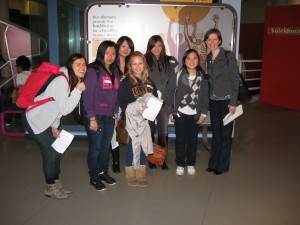My plans for working on revisions to a manuscript were derailed this morning by the news that our Student Evaluations of Teaching from last term were released. Reading these evaluations is an emotional event for me, and this is particularly true on the first look (of many!). As always, I’m filled with anxiety and hesitation: Did my students like me? Did they appreciate the risks I took in class? In testing? Did I push them to learn — just enough or too much or not enough? Did they take the time to complete the evaluations? (fyi: 583 did — which represents 54% of all my students.)
For the first look today I examined the numbers, particularly the six UBC University Module Items (UMIs), just to get a feel for what they’re saying. Here are my impressions of these numbers for 2009/2010: Overall, I’m satisfied, with some exceptions (both high and low). Psyc 217, Research Methods, is a course I love and have now taught 4 times — and I’m pleased to report that my students rate it highly. Students in my Intro Psychology courses, both terms, rated me well but not exceptional, and I think that’s totally fair. It was my first time teaching those courses, and the numbers are in the range of those I received the first time I taught Psyc 217. Onward and upward!
Across all 6 courses I taught this year, my highest scores come from the “Concern for Students” UMI. This tells me that my deep value of caring for students and their learning is being witnessed in the eyes of my students, through my efforts to this put this value into action (e.g., see my teaching philosophy). Wonderful news!
My lowest ratings come from the “Fair Evaluations” item, and this concerns me. These numbers, particularly for this of all items, are difficult to interpret: Are my students perceiving the learning assessments to be very challenging (which I don’t mind), or are assessments perceived to be so demanding that success is unattainable (which I do mind)? I definitely need to ponder this one further as I dive more deeply into the data. I already know that my evaluation strategy for 208 will change considerably next year (e.g., the midterm was much too difficult and/or lengthy; peer evaluations of papers didn’t work as smoothly as I’d hoped). Of all my courses this year, 208 was the course rated most poorly by my students. I think a large part of that had to do with the complications with evaluations. It was a brand new, custom course that I designed, and although lots went well (I have loads of data on what great things students learned!), there is a lot of room for improvement.
Overall, I’m feeling pretty good about my student evaluations. They help me to see from students’ perspectives what I do well and where I need to focus my improvement efforts. Thanks to everyone who completed them! I will share further insights as I consider them further. Note that I’ll be working on revising my courses over the summer months. If you were a student in any of my courses this year, and are interested in giving some specific, constructive feedback on any aspect of the course, please feel free to contact me to set up an appointment.


 Follow
Follow